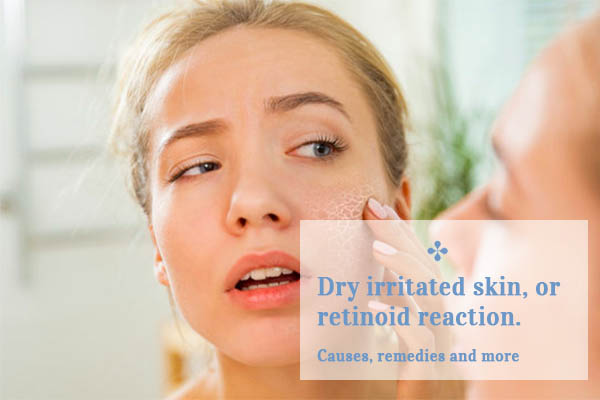Dry irritated skin, or retinoid reaction. Causes, remedies and more
By Margot de Nennie, Skin therapist
Last week I had a client for consultation with the question: ‘I have such a tight feeling on my skin lately, why is that? After checking with her whether the use of other skincare, medication or specific lifestyle habits were involved, this turned out not to be the case. This client is certainly not the first to ask such a question. Problems such as redness, sensitivity and skin irritations have increased considerably these recent weeks. How come these symptoms increase in the last period of time?

For starters, some background about retinol
Temperatures are dropping and people are using more and more products containing active ingredients, also known as Cosmeceuticals. A well-known and indispensable ingredient for skin improvement is vitamin A. Vitamin A has several forms, called Retinoids, of which retinol is perhaps best known and most popular. For starters, when we talk about retinol, we’re actually talking about retinoids. There are a number of different types of retinoids and they are available in different strengths, so it can seem a little confusing if you’ve never come across the ingredient before. All of the different types are derived from Vitamin A – the difference between them lies in the concentration. Retinoic acid (also known as Retin-A or Tretinoin) is the strongest, prescription level retinoid that’s often used to treat acne as well as ageing. All other retinoids from strongest to weakest include retinaldehyde, retinol and then retinol esters (such as retinyl palmitate). When applied in high concentrations and large quantities it can cause skin irritation. Among the many benefits of retinol, it can increase cell turnover and stimulate collagen and elastin production. However, when skin renewal goes too fast, skin irritation can occur. Irritation by retinoids is called retinoid dermatitis. It causes flaking, redness and hypersensitivity of the skin when touched. These side effects usually occur 2- 4 days after the application of the retinoid product. When you stop using the product, this reaction diminishes automatically.
Stop or continue when your skin feels irritated?
But, please, don’t let that put you off. You do not want to completely stop using a retinoid product because it has so many positive effects on improving the skin. It’s one of the only proven ingredients to visibly reduce the appearance of ageing and it’s a skilled multi-tasker. In fact, research shows that vitamin A improves skin hydration, structure and complexion, fine lines and wrinkles are softened, it gives antioxidant protection, and you name it! So you want to use a product with vitamin A, but in the right way and with the right dosage, so that you can limit the degree of irritation. So never start with a product that contains retinol, before you are well informed about it. The right amount of vitamin A really varies per skin and per person. That is why you should consult a skin therapist and let yourself be guided when such a skin reaction occurs.
Retinoid reaction in the winter period
However, even when the skin is used to high concentration levels of retinol, your skin’s tolerance can change suddenly when temperature drops. What exactly causes this to happen? This has everything to do with ceramides. Ceramides form a double lipid layer between our horn cells and therefore play an important role in the skin’s barrier function. Ceramides retain water (moisture balance) and prevent external factors from penetrating the skin barrier. Research shows that low levels of ceramides occur to people with eczema, atopic dermatitis and ageing skin, in other words, to people with a malfunctioning skin barrier. However, changes in the environment, such as cold weather or low humidity can also lead to a decrease in these essential lipids. Our skin reacts with reduced production of ceramides when the outside temperature falls below 8 degrees Celsius.
Reduced ceramide production leads directly to a disruption of our natural skin barrier. The water in the skin evaporates easily and this results in a skin that feels dry and tight. On top of that, everything you apply to your skin, such as the essential (active) ingredients in your skin care products, is absorbed uncontrollably. For example, a higher dose of vitamin A penetrates the skin, which can lead to an unwanted retinoid reaction.
Your guide to easily get rid of side effect
Fortunately, there are several solutions to reduce the uncomfortable reactions in winter. I have listed them below.
- Adjust the frequency
It is possible to reduce the frequency of use of Vitamin A, for example by skipping a day. In this way, the skin can build up tolerance again.
- Adjust the dosage
Several studies have shown that applying a thin layer is one of the quickest solutions. However it is not clear what it does to the efficacy of the product. You can logically take this into account. When you apply less, you will also have less effect of the positive effect of vitamin A.
- Add a soothing product
The solution to continue using your favourite retinoid product in the same way is to add an extra moisturising and soothing product to your skincare routine. Please note that you pick a product that has a positive effect on repairing the skin barrier and not one that just covers the top layer of the skin. This can have a negative long-term effect. So overall, it is a very complex story to use the right products. Let yourself be well informed if you have any doubts about whether you are using the right products.
Products with immediately calming and restorative ingredients:
- Antioxidant gel, AVST gel and Super Moisturiser from Environ
- Triple Lipid Restore 2:4:2 from SkinCeuticals
- Hydrating Cream from ZO Skin Health
- Schedule an appointment with your skin therapist at our clinic for a soothing and hydrating treatment, such as the HydraFacial Premium with the luxurious booster Nassif. This booster has been specially developed to restore the hydrolipid film layer of your skin.
T 070-7370088
E Info@vanlennepkliniek.nl
© Copyright 2022 Van Lennep Kliniek




